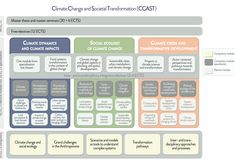UH 066 635 Master programme Climate Change and Societal Transformation

Brief description
The inter- and transdisciplinary programme Climate Change and Societal Transformation conveys a systems perspective on the global climate crisis.
Humanity is about to transgress planetary boundaries, with climate change inducing one of the most critical societal challenges. Increasingly, climate change adversely impacts our physical environment and socio-ecological systems so that growing and diverse groups of society call for a low- to zero-carbon transformation. This transformation will provide opportunities and risks for a more just society and inevitably will be conflict-laden due to trade-offs, adverse feedbacks among sectors and diverse competing interests.
Brief description
The inter- and transdisciplinary programme Climate Change and Societal Transformation conveys a systems perspective on the global climate crisis. It integrates (1) a physical understanding of the climate system, its processes and drivers, and climate change and associated impacts, (2) a socio-ecological analysis of the drivers, agents and impacts of climate change and of potential solutions, and (3) transformative approaches for a sustainable and just society explicitly taking global North-South dynamics into account. Thereby, the programme provides fundamental knowledge about the climate system and climate change as a physical phenomenon, environmental threat, and as a social and political crisis with its associated strategies and solutions.
Structure of the master programme
The programme is structured in four phases. During the onboarding and foundation phase students will obtain fundamental theoretical knowledge regarding climate change and transformation and training in core methods for inter- and transdisciplinary research. This first phase also provides the basis for deepened studies in the second phase where students select one of three specialisations.
The specialisation phase is structured as follows. The compulsory modules provide in-depth theoretical and methodological skills in the respective field and the elective modules are dedicated to further study on climate impacts on nature and society, mitigation and adaptation strategies and trade-offs/synergies with other SDGs, and transformative processes and developments towards a just and sustainable society.
The integrative closing phase brings together students from the individual specialisations. This will allow them to apply the knowledge and skills obtained in the preceding phases, work jointly in inter- and transdisciplinary settings, interact with stakeholders and practitioners, and develop creative, innovative, and sustainable approaches to solve complex real-world problems.
During the thesis phase students will work on a research problem rooted in their respective specialisation and obtain additional skills relevant to their research and training in presentation techniques during the master seminar.
Admission requirements
For admission, proof of English knowledge at level B2 (Common European Framework of Reference for Languages) must be provided.
Graduates of the bachelor’s programme in Environment and Bioresources Management (Umwelt- und Bioressourcenmanagement), Environmental Sciences and Civil Engineering (Umweltingenieurwissenschaften), Landscape Architecture and Landscape Planning (Landschaftsplanung und Landschaftsarchitektur), Agricultural Sciences (Agrarwissenschaften), and Forestry (Forstwirtschaft) offered by BOKU University are eligible for admission with no further requirements.
Graduates of other BOKU bachelor’s programmes and relevant bachelor’s programmes in natural sciences, social sciences or environmental and sustainability sciences, offered by other universities, can be admitted with no further requirements if they can prove:
- 18 ECTS Fundamentals in Natural Sciences in the fields of mathematics, physics, chemistry, meteorology, hydrology, soil science, ecology, geology, or physical geography;
- 18 ECTS Fundamentals in Social Sciences in the fields of sociology, political science, human geography, anthropology, development studies, political economy, or economics;
- 6 ECTS Fundamentals in Technical Sciences in the fields of energy planning, spatial planning, or environmental engineering.
Admission will be determined on a case-by-case basis and may be made contingent upon successful completion of additional subjects. To compensate for substantial subject-related differences, supplementary examinations may be specified. The notice of admission may specify which of these supplementary examinations are a prerequisite for taking the examinations provided in the curriculum of the master's programme. If the substantial differences exceed the extent of 30 ECTS credit points, the corresponding bachelor's programme may not be considered a relevant study programme.
Career prospects
The master’s programme qualifies graduates to pursue the following professional activities:
- Teaching and research in inter- and transdisciplinary climate and sustainability science at university level, in public and private research and educational institutions, both at national and international level.
- Development, implementation and assessment of strategies and policies for climate change mitigation and adaptation in the public sector (regional or national administration, international organizations), in non-governmental organizations, (e.g., development, environmental and nature conservation organizations), consulting and advisory firms, statistical offices, sustainability departments, etc.
- Contributing to the development and implementation of solutions for sustainable development in the public and private sector, e.g., business, public administration, non-profit organizations, social and health care, etc.
- Knowledge “translation”, communication, and dissemination: adult education, investigation and media coverage, journalism, (non-)governmental organizations and boundary organizations concerned with environment and climate, etc.
Registration

Basic Data
Programm classification no.:
UH 066 635
Duration:
4 Semester - 120 Credits
Degree:
MSc
Study Programme Coordinator
Dipl.-Kulturw. Univ. Dr. Christina Plank
Curricular committee UBRM


